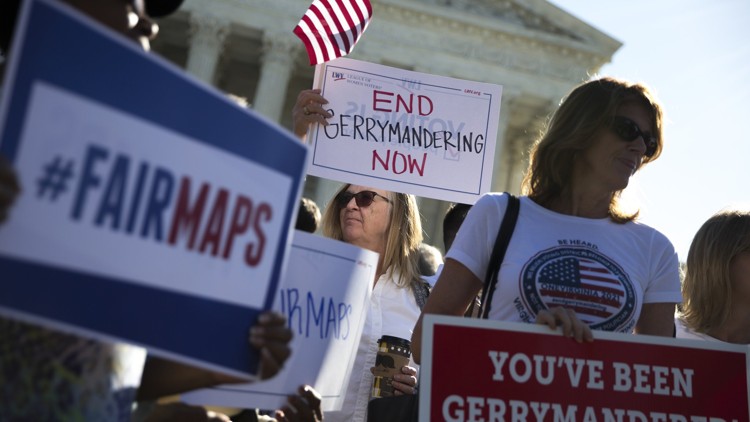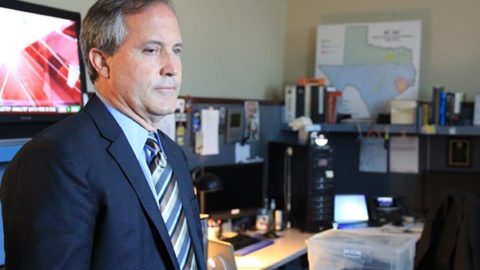Before they became election foes, Republican Texas Attorney General Ken Paxton and Democratic challenger Justin Nelson landed on opposite sides of a U.S. Supreme Court fight over the ability of politicians to gerrymander political districts to give one party a distinct advantage in future elections.
In one of this term’s most eagerly awaited cases at the high court, Paxton came down on the side of Wisconsin Republicans who are defending state Assembly districts that were ruled unconstitutional for giving the GOP a disproportionate advantage at the polls.
Because redrawing political districts after each census is an inherently partisan task, Paxton told the Supreme Court in an August brief joined by 15 other Republican-led states, there is nothing “invidious or irrational” about having a partisan political purpose in preparing new maps.
Paxton also warned about letting judges decide when the quest for partisan advantage goes too far, saying it would create legal standards so vague that every state would be exposed to lawsuits, giving the losing political party a “plausible chance” of overriding the will of a majority of lawmakers.
Nelson, on the other hand, argued that allowing the party in power to gain an outsized electoral advantage undermines democracy and improperly dilutes votes.
“The foundation of American democracy rests on ‘the consent of the governed.’ When lawmakers engage in partisan gerrymandering, they corrode this consent by punishing groups on the basis of their political beliefs in an effort to deprive them of equal representation,” Nelson wrote as the lead lawyer for a Supreme Court brief on behalf of two voter advocacy groups, FairVote and One Nation One Vote.
A Supreme Court decision in the Wisconsin political gerrymandering case, and a similar appeal arguing that Maryland Democrats gained an unfair advantage via redistricting, could come as soon as Monday as the high court closes out its term, which typically ends before July.
A ruling also is expected soon in a separate challenge to 11 Texas districts found to have been improperly drawn along racial lines. That case is being argued on legal grounds that are different from the political gerrymandering challenges.
Nelson, an Austin civil lawyer, recently made gerrymandering a campaign focus when he urged supporters to organize walks, runs, bike rides or pub crawls that cross district lines to highlight some of the odd shapes adopted by state lawmakers.
The goal of the “Walk the Lines” events, he said in a campaign video, is to show “just how ridiculous these lines are in Texas and how they disenfranchise people.”
“Voters should pick their politicians; politicians should not pick their voters,” he said in the video.
The gerrymandering issue shows a fundamental difference in legal views that he and Paxton hold, Nelson told the American-Statesman.
“I think it comes down to a basic point of view about whether one should discriminate on the basis of partisan affiliation. I think that’s wrong and unconstitutional,” Nelson said.
“I think there’s a basic misunderstanding in Texas’ brief that conflates politics with discrimination by party. So yes, legislatures have historically considered politics, but … it’s inherently wrong to discriminate. It’s wrong when Republicans do it; it’s wrong when Democrats do it. We should take favoring one party over the other out of the redistricting process,” he said.
In his brief in the Wisconsin case, Nelson argued that the Supreme Court should be willing to order new maps when states violate voters’ rights by going too far with partisan gerrymandering.
States have many options to quickly correct problems and prevent future violations, he wrote, such as creating an independent redistricting commission or adopting voting methods “that inherently undermine political gerrymandering.” Those options include ranked-choice voting — ranking candidates in order of preference — and cumulative voting, allowing as many votes as there are open seats, with voters allowed to give all votes to one candidate or divide them among several.
Paxton, in his brief to the Supreme Court, said drawing political boundaries is a job for the legislative branch, not judges.
He also warned against inviting openly partisan policy battles into the courtroom.
“Determining what is ‘politically fair’ is a task left to the states to resolve through the political process,” Paxton’s brief said. “Requiring that states minimize the partisan effects of redistricting — and tasking courts with ensuring that they do — invites massive judicial intervention in the redistricting process and draws courts further into the ‘political thicket.’ ”
There is nothing improper about seeking partisan advantage while drawing new districts, he said, adding that courts can expect a difficult time assessing gerrymandering claims because political gain is just one of many goals when new maps are drawn.
Paxton also argued that the three-judge district court panel went too far when it tossed out the Wisconsin map.
“Evidence of partisan purpose is not evidence of invidious intent. But under the district court’s approach, any effort to secure a marginal partisan advantage might qualify as prohibited invidious discrimination,” Paxton’s brief said.
The court in Wisconsin was the first federal panel in more than three decades to reject a political map for partisan gerrymandering — a new approach that Paxton urged the high court to reject.
“Never has the U.S. Supreme Court disallowed a legislative map because of partisan gerrymandering, and it surely can’t find fault with Wisconsin’s, which is lawful, constitutional and follows traditional redistricting principles,” he said shortly after his brief was filed.
Article by Chuck Lindell • View on Austin American-Statesman



